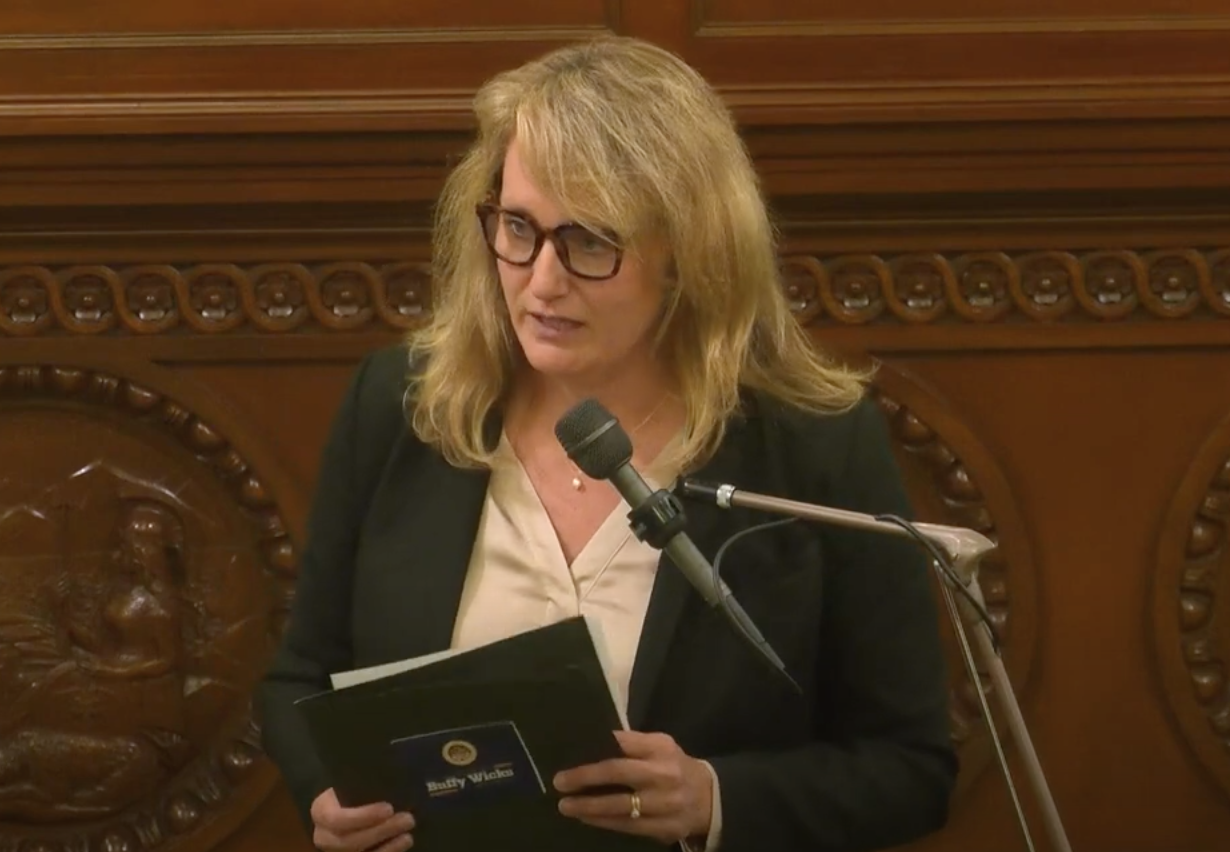In an attempt to bolster local news organizations, California and Google have agreed to a nearly $250 million five-year partnership, state officials announced Wednesday.
The deal is a first-in-the-nation partnership with the state, news publishers, major tech companies and philanthropists, unveiling two multi-year initiatives to provide ongoing financial support to newsrooms statewide and launch a National AI Accelerator, according to a statement by Assemblywoman Buffy Wicks’ office.
The Berkeley assemblywoman authored AB 886, a now defunct bill that aimed to require tech companies to compensate for the news content that is voluminously carried on platforms such as the widely used Google search engine.
The deal’s nearly $250 million in public and private funding has the majority of the funding going to newsrooms over the next five years, with a first-year goal of front-loading $100 million into the program, according to Wicks’ office. The investment amount could rise over the next several years if funding from additional private or state sources becomes available. A little more than 25% of the funding will come from California taxpayers, with the remainder from Google and possibly other private donors.
The UC Berkeley School of Journalism will administer a News Transformation Fund that will provide money to preserve and expand California-based news organizations, according to Wicks’ office. Emphasis will be on helping publications that operate in local news deserts or underrepresented communities and outlets that prioritize California news coverage.
“This agreement represents a major breakthrough in ensuring the survival of newsrooms and bolstering local journalism across California — leveraging substantial tech industry resources without imposing new taxes on Californians,” Gov. Gavin Newsom said in a statement. “The deal not only provides funding to support hundreds of new journalists but helps rebuild a robust and dynamic California press corps for years to come, reinforcing the vital role of journalism in our democracy.”
Kent Walker, president of global affairs and chief legal officer for Alphabet, Google’s parent company, said in a statement: “We appreciate the thoughtful leadership of Governor Newsom, Assemblymember Wicks, Chair Umberg, and Senator Glazer on these issues. California lawmakers have worked with the tech and news sectors to develop a collaborative framework to accelerate AI innovation and support local and national businesses and non-profit organizations. This public-private partnership builds on our long history of working with journalism and the local news ecosystem in our home state, while developing a national center of excellence on AI policy.”
Critics of the deal blasted the partnership for stopping short of enacting a law requiring compensation for news content from tech giants.
“California’s journalists did not ask for this,” Matt Pierce of Media Guild West said in an X post, adding that the deal signaled an “apparent collapse of the California legislature’s efforts to check Big Tech’s chokehold on local journalism.”
A guild bulletin to journalists Sunday night said of the deal: “Bottom line: This isn’t regulation. It’s a ratification of Google’s monopoly power over our newsrooms.”
Wicks’ AB 886 aimed “to help ensure the sustainability of local journalism, as news outlets across the country are downsizing and closing at alarming rates,” according to her office.
A recent Northwestern University study found that an average of 2.5 newspapers in the United States close each week, and that the nation has lost two-thirds of its newspaper journalists since 2005. More than 100 California newspapers have stopped publishing in the last decade.
The news fund will help sustain existing and new online publications, with an emphasis on small, local outlets and community-facing journalism.

“As technology and innovation advance, it is critical that California continues to champion the vital role of journalism in our democracy,” Wicks said in a statement. “This partnership represents a cross-sector commitment to supporting a free and vibrant press, empowering local news outlets up and down the state to continue in their essential work. This is just the beginning. I remain committed to finding even more ways to support journalism in our state for years to come.”
UC President Michael V. Drake said in a statement, “Californians depend on robust local and diverse news organizations to stay informed about their communities, and the University and specifically the UC Berkeley School of Journalism stand ready to support this endeavor.”
California News Publishers Association CEO Chuck Champion and Board Chair Julie Makinen said in a joint statement, “A vibrant press is crucial for strong communities and a healthy democracy. This is a first step toward what we hope will become a comprehensive program to sustain local news in the long term, and we will push to see it grow in future years.”
Supporters of the journalism funding initiative also noted their commitment to strengthening newsroom and ownership diversity for ethnic and underserved communities. Newsom announced his support for AB 1511, proposed legislation that if enacted would increase the state’s placement of marketing, advertising and announcements with local and underrepresented news outlets.
“Ethnic and community media outlets in California have a long history of serving as trusted messengers of culturally responsive news to historically underrepresented and underserved communities,” AssemblymanMiguel Santiago, AB 1511’s sponsor, said in a statement. “These initiatives ensure that California is embracing private sector innovation while developing partnerships with and seeding investments from the public sector to empower local publishers and journalists that are vital to a healthy, thriving democracy.”
Also, journalists, researchers and business professionals will have the opportunity to to explore new artificial intelligence resources to address society’s challenges and strengthen the workforce via a National AI Innovation Accelerator.
The AI program will be administered in collaboration with a private nonprofit company, Wicks’ office reported. The program will provide a range of organizations, industries and communities with financial assistance and other forms of support to experiment with AI in their work. The accelerator will complement the work of the state’s journalism fund by adding new tools that will help journalists access and analyze public information.
“A strong press is a key pillar of democracy, and we’re proud to be part of this partnership to utilize AI in support of local journalism across California,” Jason Kwon, chief strategy officer for OpenAI, said in a statement. “This initiative builds on our longstanding work to help newsrooms and journalists around the world leverage AI to improve workflows, better connect users to quality content, and help news organizations shape the future of this emerging technology.”
An effort at the federal level to enact a journalism preservation fund is underway, according to the News/Media Alliance. Senate Bill 1094 — introduced by Sen. Amy Klobuchar, D-Minn., and Sen. John N. Kennedy, R-La. — passed out of the Senate Judiciary Committee with a favorable vote in June 2023.
“Google is a dominant monopoly that reaps significant revenue off scraping and repackaging quality news content, depriving publishers of the opportunity to monetize their content and reinvest in journalists,” News/Media Alliance President and CEO Danielle Coffey said in a statement. “Today’s announcement reinforces the need for federal legislation and potential court remedies to address this broken marketplace.”
Officials and tech industry representatives will now begin implementing the newsroom funding and AI initiatives, which will take effect next year, according to Wicks.
On Aug. 5 a federal judge ruled against Google in an antitrust lawsuit filed by the U.S. Department of Justice for alleged anticompetitive practices in online searching and advertising.







